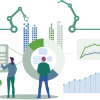News
Displaying Results 1 - 25 of 147
The most senior statisticians of countries across and beyond the UNECE region meet in Geneva this week for the 72nd annual Plenary Session of the Conference of European Statisticians. Kicking off their deliberations, a shared session with UN-GGIM Europe, the United Nations’ European geospatial body…
This week the Conference of European Statisticians (CES) meets in Geneva for its 72nd Plenary Session. On the agenda: an in-depth look at how countries can move towards a holistic way of measuring economic activity, sustainability and wellbeing.
A high-level seminar on 20 June will give CES…
The explosion in data availability is changing the world. UNECE and the international statistical community are working to ensure that data is used for the good of the public. Released today, the UNECE publication Data Stewardship and the Role of National Statistical Offices in the New Data…
UNECE has today released a detailed inventory of Thematic and Extended Accounts.
This new resource offers comprehensive insights into the economic accounts published by countries worldwide that expand on the classical measures included in core national accounts.
The System of National…
Delegations from over 40 countries in the wider European region convened in Geneva on 19-20 October to review progress towards the goals adopted by the landmark 1994 International Conference on Population and Development (ICPD) and discuss priorities for the future.
The two-day conference,…
In an increasingly digitalized world, full and equal participation in society depends on modern technologies. From work and education to healthcare and staying connected with loved ones, nearly every aspect of daily life has to some degree gone “online”. The critical role of digital technologies in…
What value do official statistics offer? The work of National Statistical Offices (NSOs), which produce the headline figures on the economy, population and environment that we see in the news every day, is driven by a conviction that such work is uniquely valuable, playing an essential role in…
A UNECE working paper released today, Population and migration statistics in Armenia: current situation, future plans and ways to improve describes how Armenia is improving its statistics on population and migration by combining administrative data with sample surveys. The study reviews innovations…
Today, according to United Nations estimates, the population of the world will for the first time reach the 8 billion mark.
Just 48 years ago, in 1974, our planet was home to four billion people. In less than half a century this has doubled, having passed through the milestones of five billion in…
New good practice guidelines for statistical offices have been published by UNECE’s body of experts dedicated to modernizing official statistics. The role of brand management, marketing and crisis communications for Statistical Organisations examines the importance of reputation for producers of…
The Handbook on Forms of Employment, published today by UNECE, will help statisticians to assess the impacts of ever-increasing diversity in where, when, how and with whom we work.
The days of ‘working nine to five’ are, for many people, gone. In fact, the idea of having a stable, permanent, full-…
The heads of national statistical offices participating in the Conference of European Statisticians have (CES) welcomed UNECE’s new Guidance for measuring the impact of the Covid-19 pandemic on women and men.
The COVID-19 pandemic continues to disrupt many aspects of daily life. The…
Evidence, in the form of data and statistics, is essential for formulating and monitoring policies. The term ‘evidence-based decision-making’, so commonly used that sometimes we don’t even think about it, makes this abundantly clear.
But we don’t just need any old evidence. If we are to be sure…
A high-level mission of United Nations experts has reviewed the plans and preparations for the upcoming census of Turkmenistan, due to take place on 17-27 December 2022. Working alongside the State Statistics Committee of Turkmenistan, the delegation— a multi-agency team consisting of experts from…
The COVID-19 pandemic has brought about immense changes in how people move around the world. International travel ground almost to a halt at the onset of the crisis, as restrictions were imposed and borders closed. Internal migration, too, was restricted in many countries as lockdowns were declared…
UNECE’s Expert Forum for Producers and Users of Climate Change-related Statistics took place in Geneva and online from 31 August to 3 September, in the run-up to COP26 later this autumn.
The annual UNECE expert forums bring together not only producers but also users of climate change-related…
The new UNECE Guide on producing CPI under lockdown, published today, helps national statistical offices to produce the Consumer Price index (CPI) under periods of lockdown and other emergencies.
The Consumer Price Index, or CPI, is a key economic indicator in most countries, giving a …
Developing the capacity of statistical systems to respond to ever-changing demands is a core component of UNECE statistical work, linked directly to several of the targets of the 2030 Agenda for Sustainable Development. Key tools used for capacity development have traditionally been face-to-face…
In 2022, we will celebrate 30 years since the formulation of the Fundamental Principles of Official Statistics and their adoption by UNECE. The Fundamental Principles were subsequently adopted in 1994 by the United Nations Statistical Commission; endorsed by the Economic and Social Council (ECOSOC…
Statistics are all around us. All the more since the COVID-19 pandemic began. Rarely do we see a news story, political debate, press conference or even a social media debate that doesn’t reference statistics. In this environment, the custodians of the figures—the national statistical offices (NSOs…
The heads of national statistical offices of 59 countries and 24 international organizations are gathering this week in Geneva and around the globe for the 69th plenary session of the Conference of European Statisticians, the decision-making body for statistical matters in the UNECE region and…
A team of expert labour statisticians is to be convened by UNECE for the Conference of European Statisticians, to investigate how to reflect new ways of working in the employment figures we use every day.
Over the past year the work-from-home orders and business closure rules issued by many…
The importance of statistical information to help us cope with disasters has never been clearer than over the past year. As the Covid-19 pandemic has gripped the world, numbers have become our bread and butter. Yet the pandemic has also highlighted the challenges and imperfections in many systems; …
International collaboration facilitated by UNECE is helping statistical organizations around the world move towards producing essential statistics in innovative ways based on machine learning (ML) and artificial intelligence (AI).
The Machine Learning 2021 Group, led by the United Kingdom’s Data…
A new working paper, Measuring Migration and Remittances in UNECE Countries during the Pandemic, reveals both innovative solutions and continued hurdles as countries strive to gather information about international migration under pandemic conditions.
The onset of the Covid-19 pandemic brought…


























